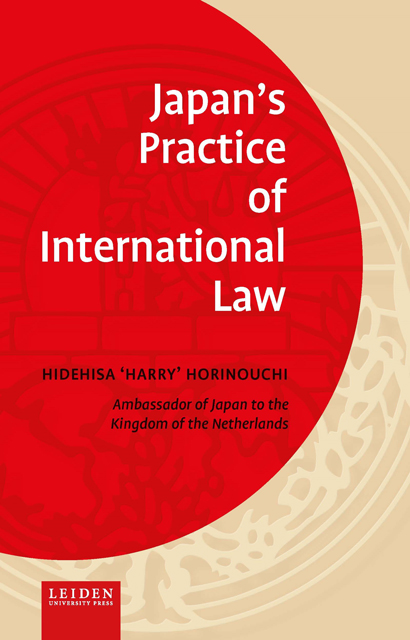Book contents
- Frontmatter
- Dedication
- Contents
- Foreword
- Chapter I Security and the Right of Self-Defense: 8 Hours on September 11
- Chapter II The End of the War: How World War II ended in Asia
- Chapter III The Remnants of War: Chemical Weapon: Poisonous Gas Accident in Qiqihar City, Heilongjiang Province
- Chapter IV Waters: Spy Vessel Incident in the Southwest Waters of Kyushu
- Chapter V Consular Affairs: Japan-China Consular Agreement:* Trajectory from the Shenyang Consulate-General Incident
- Chapter VI Human Rights of a Hijacker: CAAC Flight Hijacking Incident
- Epilogue
Chapter I - Security and the Right of Self-Defense: 8 Hours on September 11
Published online by Cambridge University Press: 12 January 2023
- Frontmatter
- Dedication
- Contents
- Foreword
- Chapter I Security and the Right of Self-Defense: 8 Hours on September 11
- Chapter II The End of the War: How World War II ended in Asia
- Chapter III The Remnants of War: Chemical Weapon: Poisonous Gas Accident in Qiqihar City, Heilongjiang Province
- Chapter IV Waters: Spy Vessel Incident in the Southwest Waters of Kyushu
- Chapter V Consular Affairs: Japan-China Consular Agreement:* Trajectory from the Shenyang Consulate-General Incident
- Chapter VI Human Rights of a Hijacker: CAAC Flight Hijacking Incident
- Epilogue
Summary
Introduction
The terrorist attacks in the United States on September 11, 2001 clearly showed the existence of a “new threat” to the entire world and that the traditional idea of “deterrence” did not apply. The fact that a private group of terrorists managed to attack the political, economic, and defense centers of the United States at about the same time using multiple hijacked commercial airliners gave an opportunity to completely change the post-Cold War US strategy.
Approximately three hours after the incident, US President George W. Bush said at Barksdale Air Force Base in Louisiana that “the United States will hunt down and punish those responsible for these cowardly acts,” and announced the United States’ intention to take decisive action against the responsible terrorists. Eight hours after President Bush’s remarks, the Government of Japan held a Cabinet Security Council on September 12, at 9:30 a.m. Japan time. After that meeting, Prime Minister Koizumi held a press conference in the prime minister’s office and said, “We, Japan, strongly support the United States and are determined to spare no effort in the necessary assistance and cooperation.”
How did Japan understand the US intention in light of international law? That understanding has led to the decision of strongly supporting the United States at the initial stage, and later became the basis of the Act on Special Measures against Terrorism. In this paper, I would like to try to verify how the Japanese government tackled the proposition of exercising the right of self-defense against large-scale terrorist acts by non-state actors and how we organized the issues under international law.
As the director of the Legal Affairs Division of the Treaty Bureau at the Ministry of Foreign Affairs of Japan at the time of the 9/11 terrorist attacks, the author was directly involved in the evaluation of this situation under international law and the drafting of the bill for special measures against terrorism. However, the views expressed in this paper do not represent the views of the Government of Japan, except for the direct citations such as the official announcements or answers to the written questions at the Diet.
First appearance of the paper: “8 hours on September 11” in Law that transcends melting boundaries (2). Security and international crime, University of Tokyo Press, September 2005.
- Type
- Chapter
- Information
- Japan’s Practice of International Law , pp. 11 - 28Publisher: Amsterdam University PressPrint publication year: 2022



